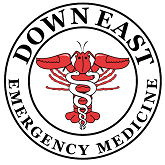High Risk Dispositions: Leaving Against Medical Advice
/The Myth of Protection
Baptist et al. found that asthma patients who left AMA had an increased risk of both relapse and subsequent ICU admissions [1]. Similarly patients with chest pain who left AMA had a higher risk of myocardial infarction than other patients with similar characteristics who stayed in the ED to complete their workup [2]. Patients who leave against medical advice are up to 10x more likely to sue the emergency physician when compared to other ED patients. Some estimate that 1 in 300 AMA cases results in a lawsuit compared to 1 in 30,000 standard ED visits [3].
The Myth of the AMA form
Patients do not have to sign formal AMA paperwork when they decide to leave the hospital. In reality these forms, which are commonly forced on patients, offer minimal legal protection and in some instances may increase provider risk. In several cases, courts have ruled that it is illegal for a hospital to require a patient to sign a waiver of liability as a “condition of their release”[4]. In a review of several similar cases, Devitt et. al concluded that the widespread use of AMA “waivers” offers little protection to providers. Instead of focusing on having a patient sign a particular form, providers should take the time to chart a detailed account of their discussions with the patient.
The Myth of Sobriety
Patients do not need to be sober to leave against medical advice. While patients need to demonstrate the capacity to make decisions, multiple courts cases have established the precedenct that intoxication alone is not a reason to prevent a patient from leaving the ED.
The Myth of Non-Payment
This is a commonly stated misconception among both providers and patients. A recent survey found that over 50% of emergency providers believed that insurance companies will not pay for visits when the patient leaves AMA. Despite the prevalence of this myth, there is essentially no evidence to support this concept that leaving AMA would place an extra financial burden on the patient. Wider et al. reviewed over 100 such ED cases. The patients were covered by 19 different insurance companies including Medicare, Medicaid, and workman’s compensation. The authors found that all of the cases were fully reimbursed by the insurers despite the patients leaving AMA [6]. Schaefer et al. examined 526 cases when the patient left AMA and found that while payment was refused in ~4% of these cases, there were no instances where payment was refused because the patient chose to leave AMA [7].
The Myth of Discharge
Treat these patients similarly to patients you are discharging normally. Sit down with the patient and attempt to answer any questions. Try to arrange reasonable follow-up,write prescriptions and give discharge instructions. The goal is to prevent the patient from having a bad outcome.
tired of Reading? Watch Dr. Delaney Discuss High Risk Dispositions at our 2016 Winter Symposium
Written by Matthew Delaney, M.D. FACEP, FAAEM
Edited and Posted by Jeffrey Holmes, M.D.
References
1. Baptist AP, Warrier I, Arora R, et al. Hospitalized patients with asthma who leave against medical advice: characteristics, reasons, and outcomes. J. Allergy Clin. Immunol. 2007;119 (4): 924-9.PMID 17239431
2. Lee TH, Short LW, Brand DA, et al. Patients with acute chest pain who leave emergency departments against medical advice: prevalence, clinical characteristics, and natural history. J Gen Intern Med.
3 (1): 21-4. PMID 3339484 3. Bitterman RA. Against medical advice: When should you take “no” for an answer? Lecture presented at ACEP Scientific Assembly. Chicago, Oct. 30, 2008.
4. Dedely v Kings Highway Hospital Center, 617 NYS 2d 445 Supp, 1994.
5. Kowalski v. St. Francis Hospital
6. Wigder HN, Propp DA, Leslie K et-al. Insurance companies refusing payment for patients who leave the emergency department against medical advice is a myth. Ann Emerg Med. 2010;55 (4): 393. Pubmed citation
7. Schaefer GR, Matus H, Schumann JH et-al. Financial responsibility of hospitalized patients who left against medical advice: medical urban legend? J Gen Intern Med. 2012;27 (7): 825- 30. Pubmed citation
















